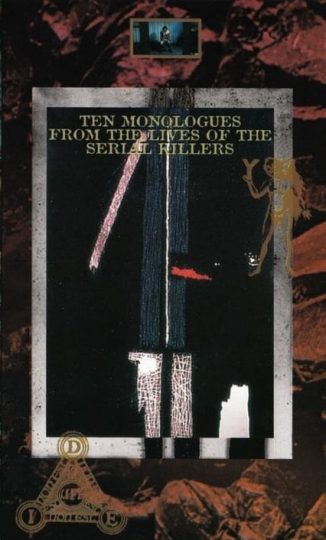 A 1994 “documentary” about serial killers that mixes actual confessions by mass murderers with fictional works by J.G. Ballard, Roberta Lannes and Henry Rollins. It’s all tied together by the South African bred, Netherlands based underground filmmaker Aryan Kaganof, back when he was known as Ian Kerkhof. Kaganof/Kerkhof’s filmography is highly uneven, filled with provocative-for-provocation’s sake cinemasturbation (see 1999’s SHABONDAMA ELEGY), but also some films that are memorable, and even brilliant in their way. Films like TEN MONOLOGUES FROM THE LIVES OF THE SERIAL KILLERS.
A 1994 “documentary” about serial killers that mixes actual confessions by mass murderers with fictional works by J.G. Ballard, Roberta Lannes and Henry Rollins. It’s all tied together by the South African bred, Netherlands based underground filmmaker Aryan Kaganof, back when he was known as Ian Kerkhof. Kaganof/Kerkhof’s filmography is highly uneven, filled with provocative-for-provocation’s sake cinemasturbation (see 1999’s SHABONDAMA ELEGY), but also some films that are memorable, and even brilliant in their way. Films like TEN MONOLOGUES FROM THE LIVES OF THE SERIAL KILLERS.
These “confessions” are presented in the form of mini-movies, each with its own look and style. At times the monologues are spoken by the performers and at others are presented via voice-overs that have no direct connection with what we’re being shown. Outside one brief portion there is no onscreen violence.
The first monologue, “Mother’s Day,” consists of a roving close-up of a middle aged man (actor Rodney Beddal) in prison, with voice-over dialogue by the serial killer Ed Kemper discussing his strained relationship with his mother.
The second monologue, “Murder Avenue,” consists of a red screen, over which play some especially violent and misogynistic rap lyrics by Geto Boys that are “dedicated to Jeffrey Dahmer.”
“The Generations of America” features a guy (Kain) in a nondescript industrial setting, alternately reciting and singing the text of J.G. Ballard’s short ATROCITY EXHIBITION piece “The Generations of America” (“Sirhan shot Robert Kennedy. And Ethel M. Kennedy shot Judith Birnbaum. And Judith Birnbaum shot Elizabeth Bochnak. And Elizabeth Bochnak shot Andrew Witwer.” Etc.).
“Childhood” features home movie footage of children and their parents frolicking on a playground, with the monologue consisting of memories (taken from the story “Goodbye Dark Love” by Roberta Lannes, read by David Swatling) by a man about being molested by his father, and attaining transcendence upon finding the latter’s corpse.
In “Prison Years and After,” adapted from a monologue by Charles Manson, a Southern accented American man (Lorand Sarna) stands in front of a large star discussing his rocky attempts at adjusting to civilian life after being let out of prison.
“Pornography” features the film’s writer-director Aryan Kaganof/Ian Kerkhof stark naked, masturbating ecstatically while images of a bound woman are projected on his body. The confession is by the late serial killer Ted Bundy, ranting about, ironically enough, the prevalence of violence in the media.
The next monologue, “Crash,” is read by Colman Hogan, and taken from the climactic passages of J.G. Ballard’s novel CRASH, describing a tryst in a crashed car while near-subliminal images taken from the rest of the film are flashed onscreen.
Another Geto Boys rap tune plays over a red screen, followed by “Diary Entry the Day Before Meltdown” by Henry Rollins, about disquieting dreams and severe misanthropy. Children are seen frolicking on a playground, where a creepy dude (Mark Bellamy) follows a woman (Pieternal Pouwels) through a tunnel.
In “That cunt” an unidentified woman (Liz Savage) is seen tied to a chair in a living room with a black hood over her face; as the segment goes on jump cuts reveal the woman in varying states of mutilation. The monologue this time consists of an interview with Kenneth Bianchi, a.k.a. the Hillside Strangler, dispassionately discussing the murders he’s committed.
Finally we get a reprise of the “Generations of America” monologue, this time spoken by a black man whose intonation grows increasingly emotional. Eventually he appears as if he’s about to break down entirely and the screen goes white.
As a study of mass murder the film, contrary to its title, doesn’t offer much in the way of insight or methodology. Killing is only mentioned in a few of the monologues—which, for that matter, aren’t always monologues, as one of them consists of snippets from an interview, one is a diary entry and one is a rap song. Yet it all weaves together into a highly singular depiction of dissociation and psychosis that does a far better job of illuminating the mindsets of those individuals who commit horrific acts than any number of more conventional serial killer dramas (of which in the 1990s there were quite a few).
Vital Statistics
TEN MONOLOGUES FROM THE LIVES OF THE SERIAL KILLERS
Film Bizarro Releasing
Director: Ian Kerkhof
Producer: Ian Kerkhof, Joost van Gelder
Screenplay: Ian Kerkhof, J.G. Ballard, Roberta Lannes, Charles Manson, Henry Rollins
Cinematographer: Joost van Gelder
Editing: Rene Hazekamp, Herbert van Drongelen
Cast: Rodney Beddal, Kain, David Swatling, Lorand Sarna, Ian Kerkhof, Colman Hogan, Mark Bellamy, Pieternal Pouwels, Liz Savage
